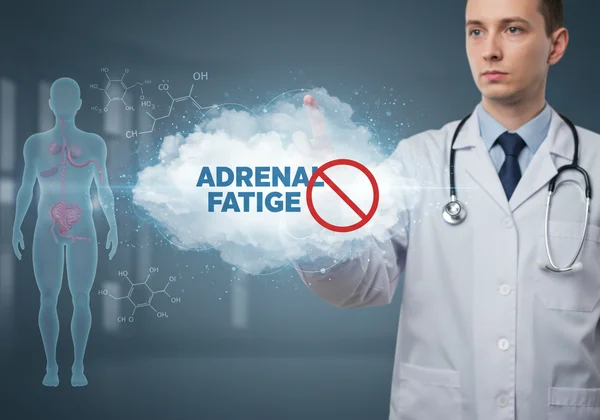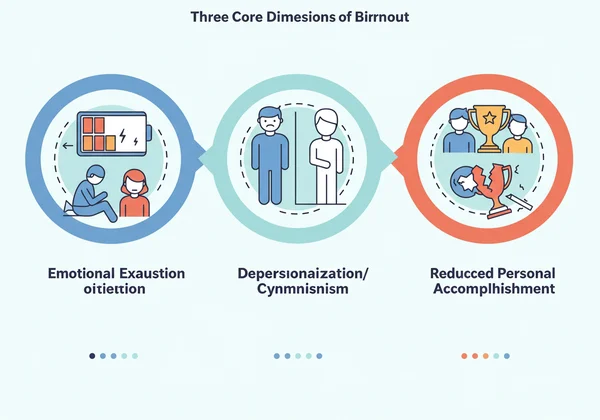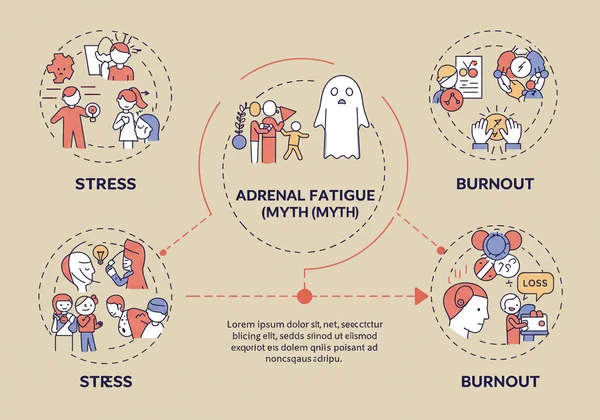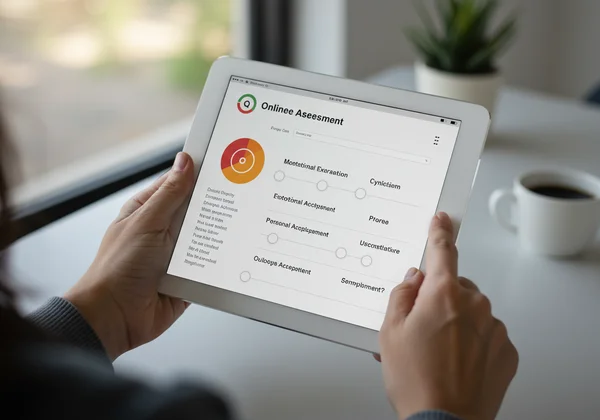Adrenal Fatigue vs. Burnout: Science vs. Myth | Burnout Test
September 7, 2025 | By Eleanor Vance
Feeling drained, overwhelmed, and utterly exhausted? You're not alone. In the search for answers, many stumble upon terms like "adrenal fatigue" and "burnout." But are they the same thing? The constant feeling of exhaustion often leads to a critical question: What can burnout be mistaken for? This confusion can send you down a rabbit hole of misinformation, delaying real recovery. The truth is, one is a scientifically recognized occupational phenomenon, while the other is a popular but medically unsupported myth.
This article will cut through the noise. We’ll explore the science behind these terms, help you understand what you might be experiencing, and guide you toward a reliable first step for gaining clarity. Knowing the difference is crucial, and a science-backed Burnout Test is the key to understanding your unique situation. If you're ready to move from confusion to clarity, you can start your assessment now.

Decoding "Adrenal Fatigue": What Science (Doesn't) Say
The term "adrenal fatigue" is widespread online, often used to describe a collection of non-specific symptoms like tiredness, body aches, and sleep disturbances. You might have even searched for an adrenal burnout test, hoping to find a simple explanation for your persistent exhaustion. The narrative is compelling because it seems to offer a straightforward biological cause for complex feelings.
The Popular Narrative: Symptoms & Self-Diagnosis
The concept of adrenal fatigue suggests that chronic stress overworks the adrenal glands, leading to an inability to produce adequate amounts of hormones, primarily cortisol. Proponents link a vast array of symptoms to this condition, including:
- Constant fatigue, especially upon waking.
- Cravings for salty or sweet foods.
- Increased effort to do everyday tasks.
- A weakened immune system.
- Dependence on caffeine or other stimulants.
This narrative is appealing because it validates the very real physical and emotional toll of prolonged stress. However, this popular understanding lacks scientific grounding.
The Medical Consensus: Why "Adrenal Fatigue" Isn't a Real Diagnosis
Despite its popularity, "adrenal fatigue" is not an accepted medical diagnosis by endocrinologists or the broader medical community. A systematic review published in BMC Endocrine Disorders found no scientific basis to support adrenal fatigue as a medical condition. The primary issues are a lack of evidence and the vague, overlapping nature of its symptoms.
Real adrenal conditions, like Addison's disease (adrenal insufficiency), are serious and diagnosable through specific tests that measure cortisol levels and the function of the endocrine system. In contrast, the symptoms attributed to "adrenal fatigue" are often signs of other underlying issues, including depression, anxiety, sleep apnea, or, most relevantly, occupational burnout. The search for an adrenal burnout test often leads to a dead end because the foundational concept is flawed. The real culprit is frequently something else entirely.

Occupational Burnout: A Clinically Recognized Reality
Unlike adrenal fatigue, occupational burnout is a legitimate phenomenon recognized by the World Health Organization (WHO) in its International Classification of Diseases (ICD-11). It's defined specifically as a syndrome resulting from chronic workplace stress that has not been successfully managed. It is not a general term for feeling tired; it is a specific, work-related condition grounded in decades of psychological research. This is where burnout science provides the clarity that the adrenal fatigue myth lacks.
The Three Core Dimensions of Burnout: Beyond Just Tiredness
The most widely accepted framework for understanding burnout is based on the Maslach Burnout Inventory (MBI), a scientifically validated tool that measures three core dimensions. Understanding these is key to recognizing true burnout:
- Emotional Exhaustion: A profound sense of being emotionally overextended and depleted of one's emotional and physical resources. It’s a deep-seated fatigue that sleep doesn’t fix.
- Depersonalization or Cynicism: A negative, detached, or excessively cynical response to your job, colleagues, and clients. It’s the feeling of mentally checking out.
- Reduced Personal Accomplishment: A feeling of incompetence and a lack of achievement and productivity at work. You may feel like you're no longer effective in your role.
A proper online burnout assessment evaluates your risk across these specific areas, providing a much more accurate picture than a generalized symptom checklist.

The Physiological & Psychological Impact of True Burnout
The chronic stress symptoms associated with burnout have a measurable impact on your body. Prolonged stress dysregulates the Hypothalamic-Pituitary-Adrenal (HPA) axis, the body's central stress response system. This doesn't mean your adrenals "fatigue," but rather that the entire regulatory system becomes less efficient, which can lead to inflammation, a weakened immune system, and increased vulnerability to illness.
Psychologically, burnout is linked to increased rates of anxiety, depression, and a pervasive sense of mental exhaustion. It affects your cognitive functions, making it harder to concentrate and solve problems. This is a complex psychophysiological state, not a simple hormonal deficiency.
Untangling Your Exhaustion: Burnout, Stress, or Just Tired?
So, how do you know what you're dealing with? Answering the question, "Am I stressed or burnout?" requires looking at the nuances of your experience. While they are related, stress and burnout are not the same, and neither should be confused with the myth of adrenal fatigue.
Key Distinctions: Stress, "Adrenal Fatigue," and Burnout
Let's break down the differences to provide some clarity:
- Stress: Often characterized by over-engagement. You have a sense of urgency, hyperactivity, and a feeling that if you could just get everything under control, you’d be okay. The emotions are heightened.
- "Adrenal Fatigue" (The Myth): A non-medical term that vaguely attributes symptoms like fatigue and cravings to exhausted adrenal glands without scientific evidence.
- Burnout: Characterized by disengagement. Instead of urgency, there's helplessness and hopelessness. Emotions are blunted, and you feel empty and detached. It is specifically tied to your work environment.
Understanding this adrenal fatigue vs burnout distinction is critical. Chasing remedies for a non-existent condition will not solve the underlying problems of a toxic work environment or unmanaged chronic stress that lead to burnout.

Why Accurate Self-Assessment is Your First Step to Recovery
Misdiagnosing your exhaustion can lead to ineffective solutions. If you believe you have "adrenal fatigue," you might focus on supplements and diets that fail to address the root causes of burnout, such as workload, lack of autonomy, or a values mismatch.
The most powerful first step is accurate self-assessment. A well-designed occupational burnout test, based on principles from the MBI, can help you identify your specific risk factors across the core dimensions of exhaustion, cynicism, and inefficacy. This isn't a medical diagnosis, but a vital tool for self-awareness that empowers you to take targeted action. You can take the free test on our site to get a clear, science-backed snapshot of your current state.

Moving Forward: Clarity and Action Against Burnout
Navigating the sea of health information online can be overwhelming, especially when you're already exhausted. Here's what truly matters: While 'adrenal fatigue' is unsupported, occupational burnout is a genuine and impactful experience. Focusing on the scientifically validated reality of burnout is your most effective path toward recovery.
Stop chasing unsupported theories and start with a foundation of knowledge. Understanding your experience through the lens of burnout science allows you to identify the true sources of your struggles and develop effective strategies for managing them. The first step is to gain clarity. Are you ready to understand what's really going on? Take the free Burnout Test today to receive an instant summary of your risk and unlock the option for a personalized, AI-driven report with actionable insights.
Frequently Asked Questions About Burnout & Fatigue
What does burnout fatigue feel like?
Burnout fatigue is more than just feeling tired after a long week. It's a profound, persistent exhaustion—physical, emotional, and mental—that isn't relieved by rest or a weekend off. It feels like having no energy to face your work, a deep sense of dread, and the inability to muster the motivation for tasks that used to be manageable.
Is it burnout, or am I just lazy?
This is a common and damaging misconception. Laziness is a choice of inaction, whereas burnout is a state of inability caused by chronic stress. People experiencing burnout often want to be productive but lack the mental and emotional resources to do so. The feeling of reduced accomplishment is a core symptom, not a character flaw. A reliable Job Burnout Test can help you distinguish the two.
Can burnout be mistaken for other conditions like depression or anxiety?
Yes, there is significant overlap. Burnout can lead to symptoms of anxiety and depression, and all three can involve fatigue and low mood. However, burnout is specifically work-related by definition, whereas depression and anxiety are typically more pervasive, affecting all areas of life. A Burnout Symptoms Test can help identify work-specific triggers, but it is crucial to consult a healthcare professional for an accurate diagnosis, as this tool is for screening, not diagnosis.
How can a burnout test help me understand my condition?
A burnout test, like the free one available at BurnoutTest.org, serves as a structured self-assessment tool. It uses questions based on established psychological principles (like the MBI) to measure your experience against the three core dimensions of burnout. It provides objective data on your risk levels, helping you move past vague feelings of exhaustion and pinpoint exactly where you're struggling—be it emotional depletion, cynicism, or a sense of ineffectiveness. This clarity is the essential first step toward taking meaningful action.